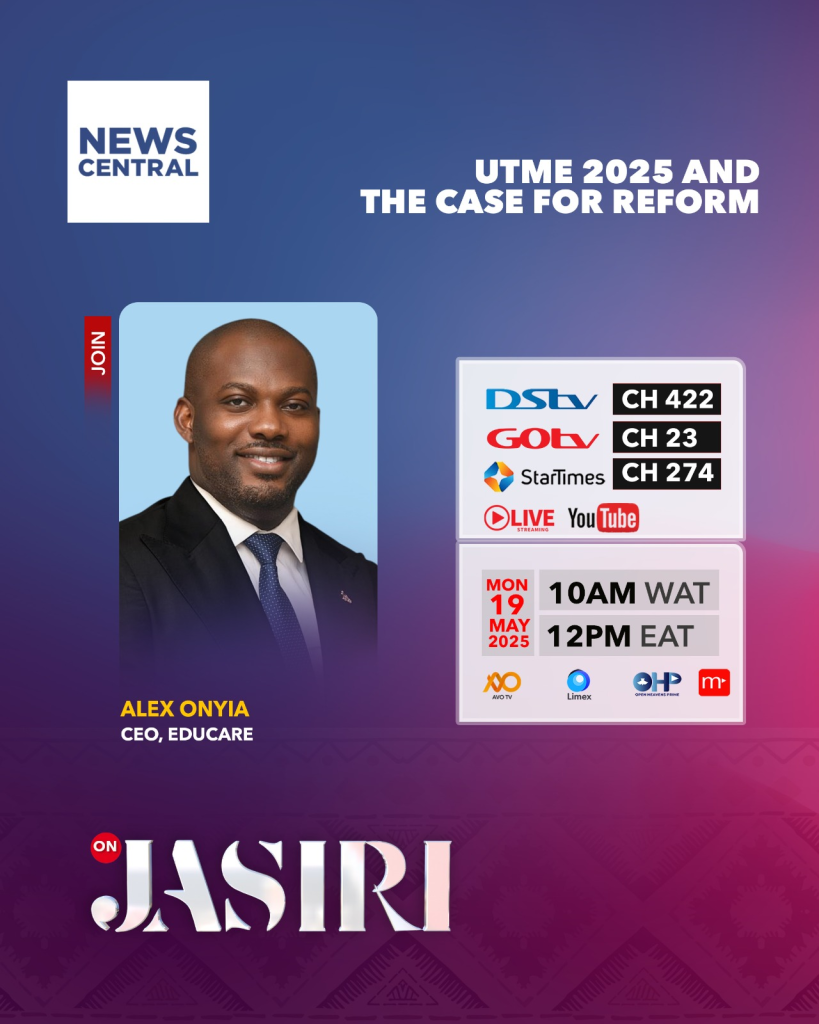The 2025 Unified Tertiary Matriculation Examination (UTME) has left thousands of candidates in limbo due to a combination of system glitches, human error, unexpected low scores and now, the prospect of a re-exam. Amid widespread frustration, Alex Oniya, CEO of Educare, joined NewsCentral’s JASIRI to shed light on what went wrong and how to fix it.
At the heart of the crisis is Nigeria’s computer-based testing (CBT) infrastructure. Oniya explained that while the Joint Admissions and Matriculation Board (JAMB) partners with private CBT centres, the oversight and technological requirements remain outdated.
“We’re in 2025, but we’re still trying to enforce 2013 systems,” he said. “JAMB needs to refine both its engagement with partners and its own systems.”

Proposals to build CBT centres in all 774 local government areas were met with scepticism by Oniya, who warned against handing such infrastructure to the government. “The reason CBT works now is because private individuals manage it. Once government takes over, expect failure.”
However, beyond technical problems, digital illiteracy among students poses a serious barrier. Many candidates, particularly from rural areas, have little or no experience using a computer until the day of their UTME.
“In my village two years ago, many children had never touched a computer. The first time they did, it was to write JAMB. Of course, they failed,” Oniya recounted. “After we simulated the exam multiple times over a year, 100% passed the following year.”
To address this, he recommended a systemic approach: termly state-wide CBT assessments. “By introducing CBT exams at the end of every term, students become familiar with the system, and we can identify educational gaps early,” he said. “Even teachers should take part—everyone must adapt.”
Touching on another sensitive issue, Oniya criticised JAMB’s handling of the 40,000 underage candidates who were allowed to register but later had their results withheld. “Why take their money if they’re not eligible? That’s exploitation. Either refund them or release their results.”
Following the tragic suicide of a candidate after receiving her UTME result, Oniya praised the establishment of JAMB’s Candidate Counselling and Emergency Services Centre but insisted that more must be done to rebuild public trust. “Students should see their results instantly, and a week later, be able to view their full mark sheet. Transparency is key.”
In terms of reforms, Oniya urged JAMB to:
- Streamline the registration and change-of-course processes
- Ensure timely, reliable release of results
- Adopt critical thinking in exam content
- Vet and manage vendor partnerships transparently
When asked if it was time to consider alternatives to JAMB for university entry, Oniya cautioned, “Let’s make JAMB efficient first. Once trust and efficiency are restored, we can consider complementary models.”
As concerns grow, stakeholders are now forced to confront a painful truth: JAMB’s credibility crisis is part of a broader educational emergency. The time for piecemeal fixes is over. Only systemic reforms can restore confidence in Nigeria’s most important gateway to higher education


 Trending
Trending 